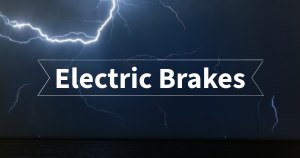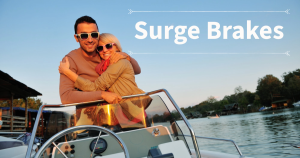Electric, Surge, & Air Brakes Explained
Are you an outdoor towing enthusiast? If so, you need to have the right equipment so that you can stay safe on the road. As a result, you need to make sure that your trailers have the right brakes suitable for your towing needs. When choosing brakes, you can choose from air brakes, surge brakes, or electric ones. If you’re not sure which ones are right for you, read on for further insight about the differences in each type of brake or air brake controller. Being well-informed can ensure you’re able to tow safely and efficiently no matter where you’re going.
Electric Brakes

One of the most common brakes to buy for your trailers are electric ones. As their name implies, they use electricity from the vehicle’s battery that powers the electromagnet inside the brake drums. When you step on the brakes on your tow vehicle, it sends a signal to those electromagnets. As a result, the brake shoes create friction when they hit the drum. The amount of current sent to the electromagnets affects the amount of force and how well you can stop the trailer.
When you opt for these types of brakes, understand that a controller must be installed inside the vehicle cabin. The controller gives the driver power to adjust the timing and the sensitivity of the electric brakes. It also allows the driver to monitor the brake performance. When it comes to controllers, you could choose from ones that are time-delayed, inertia-based, or proportional. With a company like Hayes, you have the ability to choose between types of brakes, but also the type of controllers you use.
Do you prefer a time-delayed brake controller? If so, the Energize III may be the right one for you. These controllers come with a manual override as well as a digital display. You can mount them at any angle for optimum reliability. For an inertia-based brake controller, consider the G2 Brake Boss. This controller can sense the deceleration of the tow vehicle and also comes with a manual override in digital display. Its diagnostic features also make it easier to use on your trailer.
When you choose electric brakes for your trailer, you’re choosing ones that are often easy to maintain and install. You can rely on them for consistent brake performance regardless of the type of road conditions you’re operating on. So if you’re going through rough or hilly terrain, electric brakes may be the perfect solution for your big trailer. You can control the braking force independently from the tow vehicle itself, which gives you optimal control and safety.
One thing to be cautious about when you’re comparing electric brakes to others is they may not be suitable for submerging in water, as water and electronics don’t mix. While your electric brakes are great for different types of road terrain, if you’re in an environment where floods are at risk, you want to consider a different option. Also, be aware of the amount of time you’re using your brakes to avoid overheating.
Surge Brakes

Hydraulics have been useful throughout various types of vehicles. If you prefer hydraulics over electronics, consider using surge brakes for your trailers. Your surge brakes rely on hydraulic fluid to activate the brake drums. The trailer pushes against a hitch and compresses a hydraulic cylinder when you apply the brakes. This action applies pressure on brake lines, which later applies the brakes on the trailer itself.
Unlike electric brakes, you don’t need a brake controller for surge brakes. These types of brakes are self-contained units that automatically work whenever you slow down or come to a stop on the road. You can play it safe by getting some that have a lockout feature or manual override. Manual overrides and lockout features come in handy when you need to back up or when you’re driving in less than favorable conditions such as rainy or icy weather.
People who own boats often prefer surge brakes because of their ability to submerge safely in water. So you won’t have to worry about these brakes becoming damaged because of their exposure to water or humidity. These are also some of the easiest brakes to use and don’t require any additional knowledge of a braking system. Since they automatically work whenever you slow down the vehicle, all you need to do is let the brakes work their magic. Since they work independently from your vehicle, they won’t cause any strain or issues on your vehicle brakes or electrical system.
When it comes to safety and maintenance, opting for surge brakes certainly has more benefits. There are no electrical parts, so you don’t have to worry about the risk associated with electrical fires or malfunctions. These brakes are reliable when it’s time to stop and can prevent your trailer from swaying as long as you properly adjust them. They also have fewer parts compared to other brakes, so there’s less maintenance to worry about. Drivers must be aware of the quality of the hydraulic fluid in these brakes, as that can cause them to lose effectiveness if they leak or become contaminated.
Air Brakes

These brakes operate by compressed air to activate the brake drum. An air compressor sends air to your reservoir tank whenever you apply the brakes on a vehicle. From there, that air goes through various hoses and valves until it reaches the brake chambers. Then the air presses on pistons that apply the brakes on the trailer itself.
When you use air brakes, the air is in unlimited supply. Therefore, you don’t have to worry about fluid leaks or fuel to use them. They’re one of the most durable brakes to use, which may be why you tend to see them on large vehicles and commercial ones. Heavy-duty trucks, buses, and trailers often use these types of brakes, and they require a special license to operate them.
Hayes has an accentuated air brake controller, which is a proportional brake controller that senses when the vehicle is about to stop. It has a manual or automatic braking operation as well as hazard flashers.
While electric and surge brakes have their main qualities, air brakes are the most suitable ones for heavy loads. Drivers who use these types of brakes have access to an anti-lock braking system that prevents the vehicle from skidding or locking the wheels. People who use them should also be aware to properly maintain them as they become very noisy when worn down. These brakes shouldn’t be submerged in water since it can damage the air components.
Remember that all brakes aren’t suitable for just any type of vehicle. Be mindful of the type of work you’re trying to do, the terrain you’re operating on, as well as the climate. Some brakes can handle water, while others can handle rough road conditions. If you’re unsure what brakes or air brake controller is ideal for you, rely on professionals at Hayes. Our company has been in the business for many years and specializes in the right electrical surge and air brakes for you and your vehicles. Contact us today for more information!
Hayes Towing Electronics Products are Proudly Made in the U.S.A. and In-Stock!











